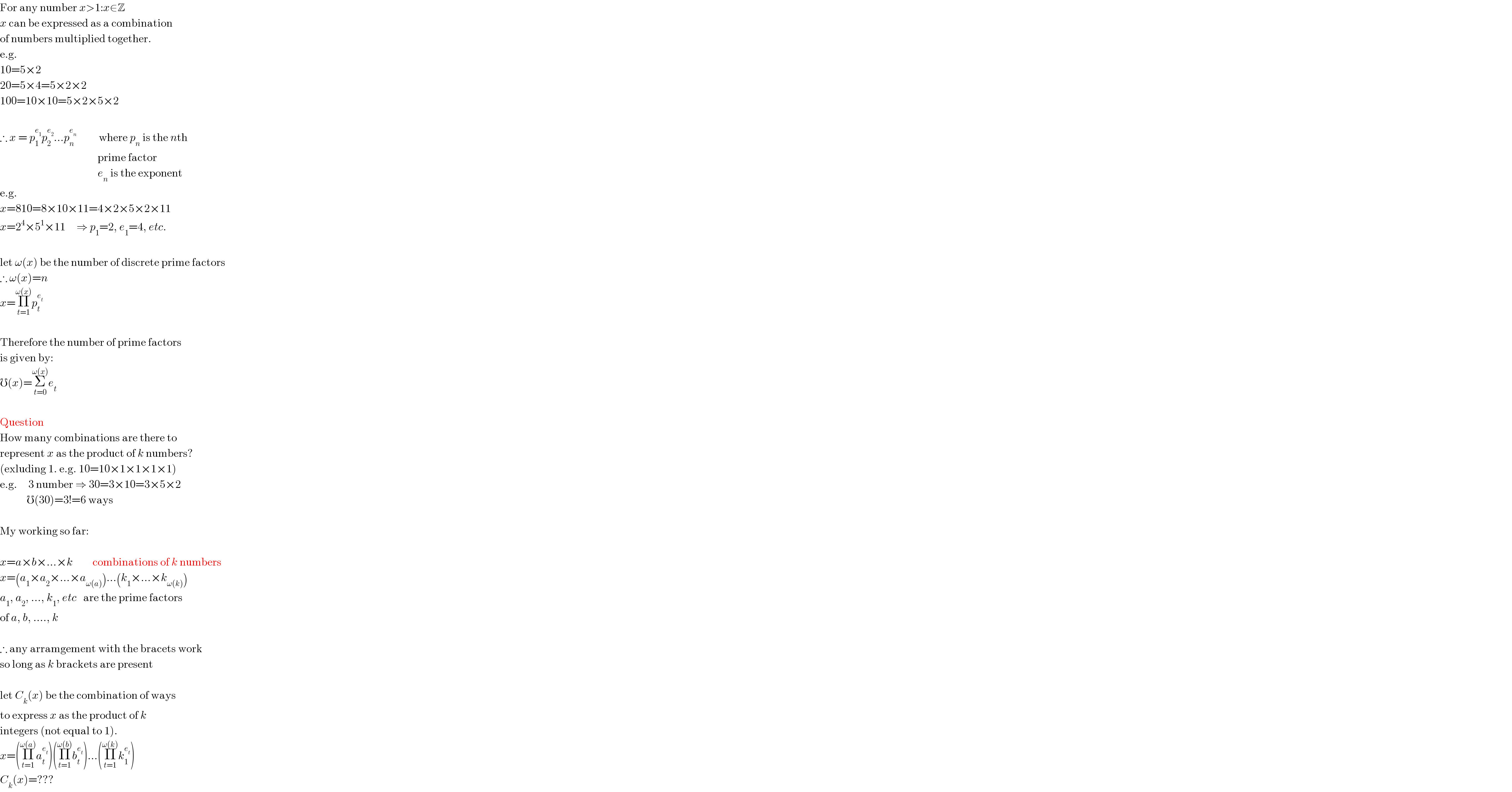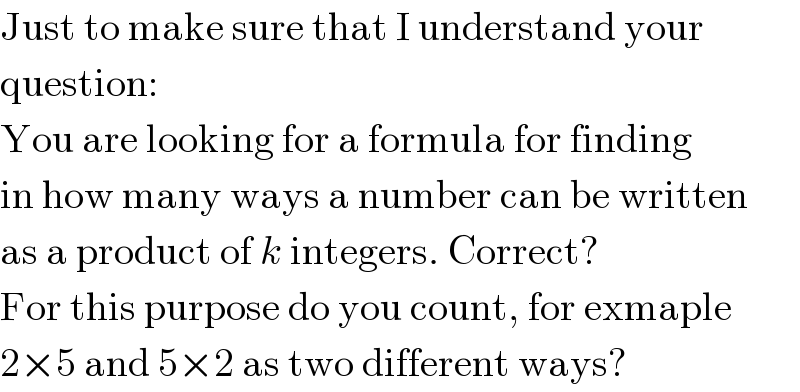Question Number 7289 by FilupSmith last updated on 21/Aug/16

$$\mathrm{For}\:\mathrm{any}\:\mathrm{number}\:{x}>\mathrm{1}:{x}\in\mathbb{Z} \\ $$$${x}\:\mathrm{can}\:\mathrm{be}\:\mathrm{expressed}\:\mathrm{as}\:\mathrm{a}\:\mathrm{combination} \\ $$$$\mathrm{of}\:\mathrm{numbers}\:\mathrm{multiplied}\:\mathrm{together}. \\ $$$$\mathrm{e}.\mathrm{g}. \\ $$$$\mathrm{10}=\mathrm{5}×\mathrm{2} \\ $$$$\mathrm{20}=\mathrm{5}×\mathrm{4}=\mathrm{5}×\mathrm{2}×\mathrm{2} \\ $$$$\mathrm{100}=\mathrm{10}×\mathrm{10}=\mathrm{5}×\mathrm{2}×\mathrm{5}×\mathrm{2} \\ $$$$\: \\ $$$$\therefore\:{x}\:=\:{p}_{\mathrm{1}} ^{{e}_{\mathrm{1}} } {p}_{\mathrm{2}} ^{{e}_{\mathrm{2}} } …{p}_{{n}} ^{{e}_{{n}} } \:\:\:\:\:\:\:\:\:\:\mathrm{where}\:{p}_{{n}} \:\mathrm{is}\:\mathrm{the}\:{n}\mathrm{th} \\ $$$$\:\:\:\:\:\:\:\:\:\:\:\:\:\:\:\:\:\:\:\:\:\:\:\:\:\:\:\:\:\:\:\:\:\:\:\:\:\:\:\:\:\:\:\:\mathrm{prime}\:\mathrm{factor} \\ $$$$\:\:\:\:\:\:\:\:\:\:\:\:\:\:\:\:\:\:\:\:\:\:\:\:\:\:\:\:\:\:\:\:\:\:\:\:\:\:\:\:\:\:\:\:{e}_{{n}} \:\mathrm{is}\:\mathrm{the}\:\mathrm{exponent} \\ $$$$\mathrm{e}.\mathrm{g}. \\ $$$${x}=\mathrm{810}=\mathrm{8}×\mathrm{10}×\mathrm{11}=\mathrm{4}×\mathrm{2}×\mathrm{5}×\mathrm{2}×\mathrm{11} \\ $$$${x}=\mathrm{2}^{\mathrm{4}} ×\mathrm{5}^{\mathrm{1}} ×\mathrm{11}\:\:\:\:\:\Rightarrow\:{p}_{\mathrm{1}} =\mathrm{2},\:{e}_{\mathrm{1}} =\mathrm{4},\:{etc}. \\ $$$$\: \\ $$$$\mathrm{let}\:\omega\left({x}\right)\:\mathrm{be}\:\mathrm{the}\:\mathrm{number}\:\mathrm{of}\:\mathrm{discrete}\:\mathrm{prime}\:\mathrm{factors} \\ $$$$\therefore\:\omega\left({x}\right)={n} \\ $$$${x}=\underset{{t}=\mathrm{1}} {\overset{\omega\left({x}\right)} {\prod}}{p}_{{t}} ^{{e}_{{t}} } \\ $$$$\: \\ $$$$\mathrm{Therefore}\:\mathrm{the}\:\mathrm{number}\:\mathrm{of}\:\mathrm{prime}\:\mathrm{factors} \\ $$$$\mathrm{is}\:\mathrm{given}\:\mathrm{by}: \\ $$$$\mho\left({x}\right)=\underset{{t}=\mathrm{0}} {\overset{\omega\left({x}\right)} {\sum}}{e}_{{t}} \\ $$$$\: \\ $$$$\mathrm{Question} \\ $$$$\mathrm{How}\:\mathrm{many}\:\mathrm{combinations}\:\mathrm{are}\:\mathrm{there}\:\mathrm{to} \\ $$$$\mathrm{represent}\:{x}\:\mathrm{as}\:\mathrm{the}\:\mathrm{product}\:\mathrm{of}\:{k}\:\mathrm{numbers}? \\ $$$$\left(\mathrm{exluding}\:\mathrm{1}.\:\mathrm{e}.\mathrm{g}.\:\mathrm{10}=\mathrm{10}×\mathrm{1}×\mathrm{1}×\mathrm{1}×\mathrm{1}\right) \\ $$$$\mathrm{e}.\mathrm{g}.\:\:\:\:\:\mathrm{3}\:\mathrm{number}\:\Rightarrow\:\mathrm{30}=\mathrm{3}×\mathrm{10}=\mathrm{3}×\mathrm{5}×\mathrm{2} \\ $$$$\:\:\:\:\:\:\:\:\:\:\:\:\mho\left(\mathrm{30}\right)=\mathrm{3}!=\mathrm{6}\:\mathrm{ways} \\ $$$$\: \\ $$$$\mathrm{My}\:\mathrm{working}\:\mathrm{so}\:\mathrm{far}: \\ $$$$\: \\ $$$${x}={a}×{b}×…×{k}\:\:\:\:\:\:\:\:\:\mathrm{combinations}\:\mathrm{of}\:{k}\:\mathrm{numbers} \\ $$$${x}=\left({a}_{\mathrm{1}} ×{a}_{\mathrm{2}} ×…×{a}_{\omega\left({a}\right)} \right)…\left({k}_{\mathrm{1}} ×…×{k}_{\omega\left({k}\right)} \right) \\ $$$${a}_{\mathrm{1}} ,\:{a}_{\mathrm{2}} ,\:…,\:{k}_{\mathrm{1}} ,\:{etc}\:\:\:\mathrm{are}\:\mathrm{the}\:\mathrm{prime}\:\mathrm{factors} \\ $$$$\mathrm{of}\:{a},\:{b},\:….,\:{k} \\ $$$$\: \\ $$$$\therefore\:\mathrm{any}\:\mathrm{arramgement}\:\mathrm{with}\:\mathrm{the}\:\mathrm{bracets}\:\mathrm{work} \\ $$$$\mathrm{so}\:\mathrm{long}\:\mathrm{as}\:{k}\:\mathrm{brackets}\:\mathrm{are}\:\mathrm{present} \\ $$$$\: \\ $$$$\mathrm{let}\:{C}_{{k}} \left({x}\right)\:\mathrm{be}\:\mathrm{the}\:\mathrm{combination}\:\mathrm{of}\:\mathrm{ways} \\ $$$$\mathrm{to}\:\mathrm{express}\:{x}\:\mathrm{as}\:\mathrm{the}\:\mathrm{product}\:\mathrm{of}\:{k} \\ $$$$\mathrm{integers}\:\left(\mathrm{not}\:\mathrm{equal}\:\mathrm{to}\:\mathrm{1}\right). \\ $$$${x}=\left(\underset{{t}=\mathrm{1}} {\overset{\omega\left({a}\right)} {\prod}}{a}_{{t}} ^{{e}_{{t}} } \right)\left(\underset{{t}=\mathrm{1}} {\overset{\omega\left({b}\right)} {\prod}}{b}_{{t}} ^{{e}_{{t}} } \right)…\left(\underset{{t}=\mathrm{1}} {\overset{\omega\left({k}\right)} {\prod}}{k}_{\mathrm{1}} ^{{e}_{{t}} } \right) \\ $$$${C}_{{k}} \left({x}\right)=??? \\ $$
Commented by FilupSmith last updated on 21/Aug/16
![lets say you was x as the product of two integers. i.e. k=2 x=(a_1 ×a_2 ×a_3 ...a_α )(b_1 ×b_2 ×b_3 ...b_β ) =(a_1 ×b_2 ×a_3 ...a_α )(b_1 ×a_2 ×b_3 ...b_β ) etc x=(Π_(t=1) ^(ω(a)) a_t ^α_t )(Π_(k=1) ^(ω(b)) b_t ^β_t ) C_2 (x)=(Σ_(t=1) ^(ω(a)) α_t +Σ_(t=1) ^(ω(b)) β_t ) C_2 (x)=(℧(a)+℧(b))! therefore does: C_k (x)=[℧(a)+℧(b)+...+℧(k)]!](https://www.tinkutara.com/question/Q7291.png)
$$\mathrm{lets}\:\mathrm{say}\:\mathrm{you}\:\mathrm{was}\:{x}\:\mathrm{as}\:\mathrm{the}\:\mathrm{product}\:\mathrm{of}\:\mathrm{two}\:\mathrm{integers}. \\ $$$$\mathrm{i}.\mathrm{e}.\:\:{k}=\mathrm{2} \\ $$$$ \\ $$$${x}=\left({a}_{\mathrm{1}} ×{a}_{\mathrm{2}} ×{a}_{\mathrm{3}} …{a}_{\alpha} \right)\left({b}_{\mathrm{1}} ×{b}_{\mathrm{2}} ×{b}_{\mathrm{3}} …{b}_{\beta} \right) \\ $$$$\:\:\:=\left({a}_{\mathrm{1}} ×{b}_{\mathrm{2}} ×{a}_{\mathrm{3}} …{a}_{\alpha} \right)\left({b}_{\mathrm{1}} ×{a}_{\mathrm{2}} ×{b}_{\mathrm{3}} …{b}_{\beta} \right) \\ $$$${etc} \\ $$$${x}=\left(\underset{{t}=\mathrm{1}} {\overset{\omega\left({a}\right)} {\prod}}{a}_{{t}} ^{\alpha_{{t}} } \right)\left(\underset{{k}=\mathrm{1}} {\overset{\omega\left({b}\right)} {\prod}}{b}_{{t}} ^{\beta_{{t}} } \right) \\ $$$${C}_{\mathrm{2}} \left({x}\right)=\left(\underset{{t}=\mathrm{1}} {\overset{\omega\left({a}\right)} {\sum}}\alpha_{{t}} +\underset{{t}=\mathrm{1}} {\overset{\omega\left({b}\right)} {\sum}}\beta_{{t}} \right) \\ $$$${C}_{\mathrm{2}} \left({x}\right)=\left(\mho\left({a}\right)+\mho\left({b}\right)\right)! \\ $$$$ \\ $$$$\mathrm{therefore}\:\mathrm{does}: \\ $$$${C}_{{k}} \left({x}\right)=\left[\mho\left({a}\right)+\mho\left({b}\right)+…+\mho\left({k}\right)\right]! \\ $$
Commented by prakash jain last updated on 21/Aug/16

$$\mathrm{Just}\:\mathrm{to}\:\mathrm{make}\:\mathrm{sure}\:\mathrm{that}\:\mathrm{I}\:\mathrm{understand}\:\mathrm{your} \\ $$$$\mathrm{question}: \\ $$$$\mathrm{You}\:\mathrm{are}\:\mathrm{looking}\:\mathrm{for}\:\mathrm{a}\:\mathrm{formula}\:\mathrm{for}\:\mathrm{finding} \\ $$$$\mathrm{in}\:\mathrm{how}\:\mathrm{many}\:\mathrm{ways}\:\mathrm{a}\:\mathrm{number}\:\mathrm{can}\:\mathrm{be}\:\mathrm{written} \\ $$$$\mathrm{as}\:\mathrm{a}\:\mathrm{product}\:\mathrm{of}\:{k}\:\mathrm{integers}.\:\mathrm{Correct}? \\ $$$$\mathrm{For}\:\mathrm{this}\:\mathrm{purpose}\:\mathrm{do}\:\mathrm{you}\:\mathrm{count},\:\mathrm{for}\:\mathrm{exmaple} \\ $$$$\mathrm{2}×\mathrm{5}\:\mathrm{and}\:\mathrm{5}×\mathrm{2}\:\mathrm{as}\:\mathrm{two}\:\mathrm{different}\:\mathrm{ways}? \\ $$
Commented by FilupSmith last updated on 21/Aug/16

$$\mathrm{correct} \\ $$
